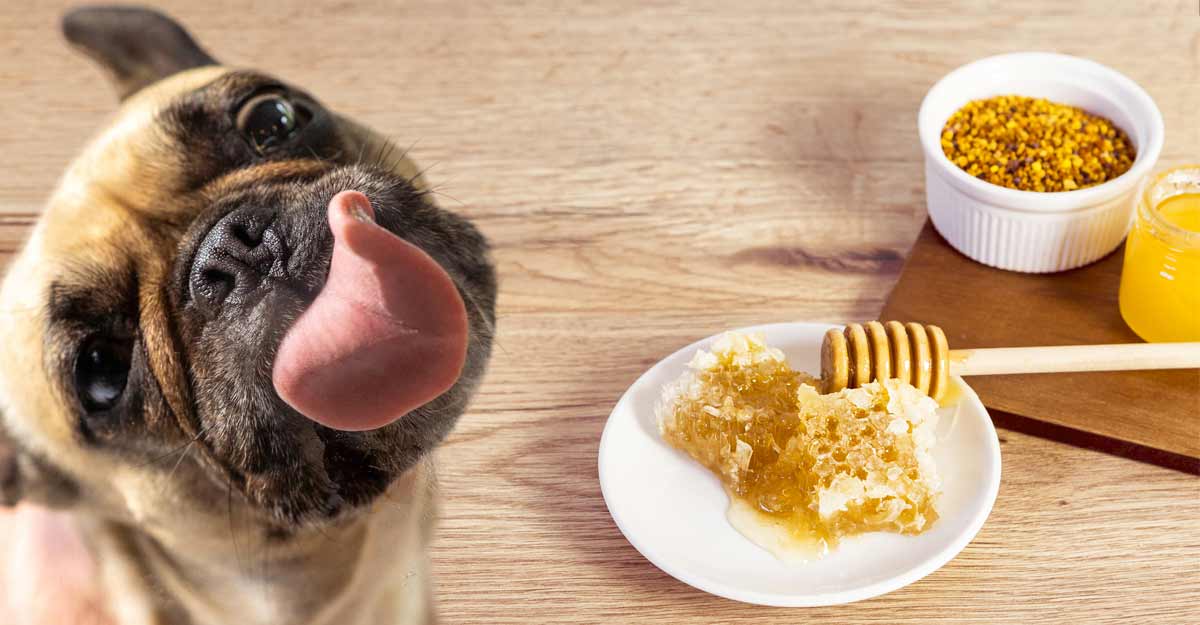
Blog » Health & Safety » Can Dogs Eat Honey?
Can Dogs Eat Honey?

Honey is delicious, sweet, and found in almost every kitchen. Many dog parents wonder if their pups can safely enjoy honey too.
Let’s explore whether dogs can eat honey, the benefits, and some important safety tips.
Is Honey Safe for Dogs?
Yes, honey is safe for dogs in small amounts. It’s naturally sweet and packed with beneficial nutrients, but there are a few things to keep in mind.
Honey is high in natural sugars. Feeding too much can cause weight gain, tooth decay, or digestive issues in dogs. If your dog has diabetes, honey isn’t suitable because it raises blood sugar levels.
Raw honey should not be given to puppies or dogs with weak immune systems. It sometimes contains botulism spores, which their developing immune systems can’t handle yet.
Always consult your veterinarian if you’re unsure whether honey is right for your dog.
Benefits of Honey for Dogs
In moderation, honey offers several health benefits for your pup:
Helps Soothe Coughs and Throat Irritation
Just like humans, dogs can get sore throats or coughs. A small amount of honey can help soothe your dog’s throat, especially with conditions like kennel cough.
Allergy Relief
Local raw honey contains tiny amounts of pollen. Feeding small amounts regularly might help your dog build resistance to local allergens, reducing seasonal allergy symptoms.
Supports Digestive Health
Honey is known to aid digestion because it contains natural prebiotics. These help healthy gut bacteria grow and can relieve minor digestive problems such as mild constipation or diarrhoea.
Skin Healing and Antibacterial Properties
Honey has antimicrobial and anti-inflammatory properties. This makes it useful for minor skin irritations like hot spots, small cuts, or scrapes. A thin layer of honey can encourage faster healing.
How Much Honey Can Dogs Eat?
As a general rule:
- Small dogs (under 10kg): ½ teaspoon daily
- Medium dogs (10-25kg): 1 teaspoon daily
- Large dogs (over 25kg): Up to 2 teaspoons daily
Always introduce new foods slowly. Start with small amounts and watch for any signs of digestive upset or allergic reactions.
There’s Honey and Then There’s Manuka Honey
Not all honey is the same. Manuka honey is special and offers even more powerful benefits.
Produced in New Zealand and Australia, Manuka honey contains Unique Manuka Factor (UMF). This compound has strong antibacterial properties that can help heal serious infections and persistent wounds.
In fact, medical-grade Manuka honey has been successful against tough infections like MRSA (Methicillin-resistant Staphylococcus aureus), a bacteria resistant to many antibiotics.
A recent study found that medical-grade honey successfully treated canine ear infections (otitis externa), even infections resistant to other treatments.
Why Manuka Honey Is Special
Manuka honey’s antibacterial strength comes from its unique compounds like methylglyoxal (MGO). It fights harmful bacteria, viruses, and fungi effectively.
Choose medical-grade Manuka honey with a UMF rating of 10 or higher for medicinal use.
How to Use Manuka Honey
For Wounds and Skin Issues
Apply medical-grade Manuka honey directly to clean, minor wounds or irritations. Cover with a clean dressing to prevent licking.
For Internal Health
Give orally to boost immunity, soothe coughs, or support digestive health. Follow dosage guidelines:
- Under 10kg: ½ teaspoon twice daily
- 10-25kg: 1 teaspoon twice daily
- Over 25kg: 2 teaspoons twice daily
Avoid giving Manuka honey to diabetic dogs and puppies under 12 months.
FYI: Manuka Honey and Green Clay for Serious Infections
Manuka honey combined with green clay has also shown promise in treating MRSA infections. A published study found that this combination effectively tackled resistant bacterial infections, making it a valuable tool in veterinary medicine.
Dr Karen Becker, a renowned integrative vet, links to this research and frequently recommends Manuka honey for healing serious infections. She’s passionate about animal welfare and holistic care, advocating for safe and effective natural treatments for pets.
Supporting Bees: Nature’s Tiny Healers
Honey’s benefits are thanks to hardworking bees. By choosing responsibly sourced, raw, or Manuka honey, you support bee populations, helping protect these important pollinators.
Avoid using pesticides in your garden and plant bee-friendly flowers to contribute positively to the environment and keep bees thriving.
Final Thoughts from The Luna Collection Family
At The Luna Collection, our dogs are family. Like our stylish yet practical accessories, we choose treats and remedies carefully.
Honey is a favourite ingredient at Luna HQ. Our pups enjoy a little honey in some of their homemade treats, especially their famous birthday cakes. We’ll share our much-loved recipe on the blog soon—it’s always a hit with our furry family and their four-legged friends.
Honey can be a wonderful addition to your dog’s health routine when given safely and in moderation. As always, check with your vet if you’re uncertain, and here’s to keeping your beloved pups happy and healthy.
Wondering what other foods are safe or harmful for your dog? Check out our comprehensive guide on Toxic Foods for Dogs to keep your pup safe and healthy!
Lots of love from all of us x
Further Reading: Highly Recommended Sources
Share This Post



